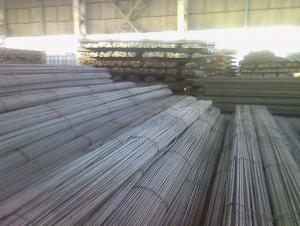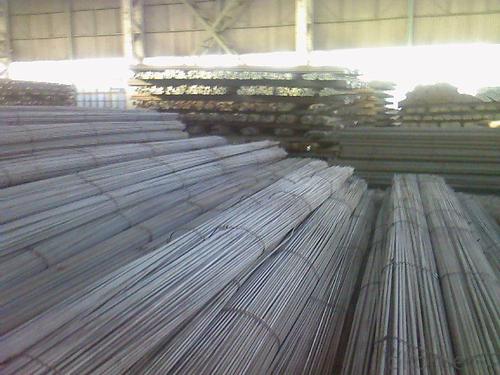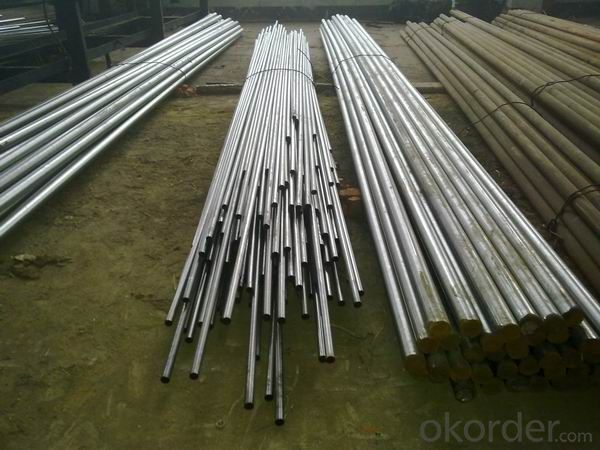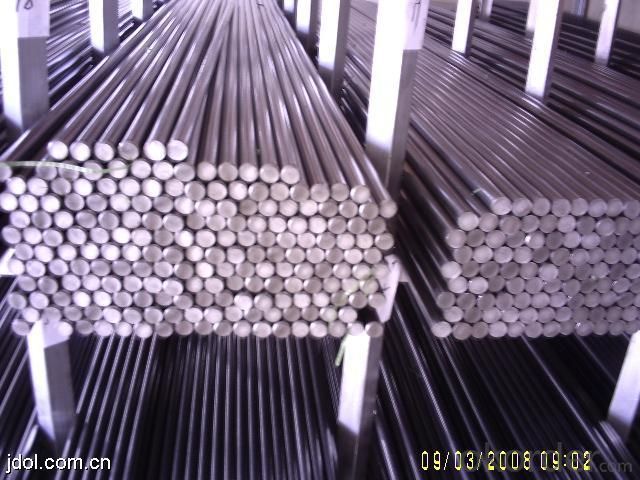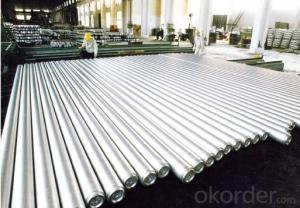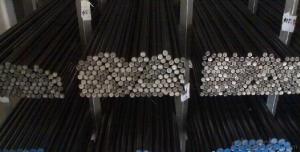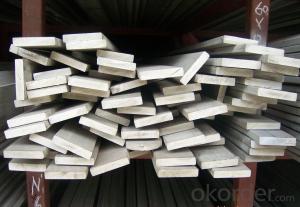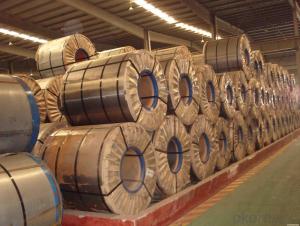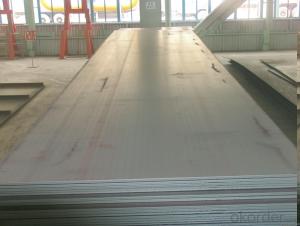Spring Steel 65Si2Mn
- Loading Port:
- China Main Port
- Payment Terms:
- TT OR LC
- Min Order Qty:
- -
- Supply Capability:
- -
OKorder Service Pledge
Quality Product, Order Online Tracking, Timely Delivery
OKorder Financial Service
Credit Rating, Credit Services, Credit Purchasing
You Might Also Like
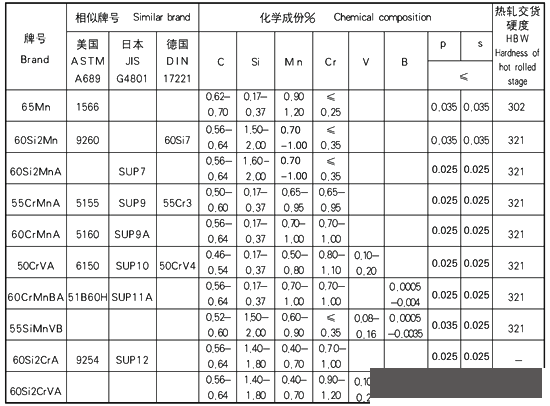
Minimum order Quantity:100tons
Sizes:50--200mm
Application: The spring steel can be used to make the spring which is used in the car, truck,vessel etc.
- Q: What are the different grades of alloy steel round bars?
- There are several different grades of alloy steel round bars, including but not limited to, 4140, 4340, 8620, and 52100. Each grade offers specific properties and characteristics that make them suitable for different applications and industries.
- Q: What is the tolerance level for steel round bars?
- The tolerance level for steel round bars can vary depending on several factors such as the grade and diameter of the bar, as well as the specific industry standards and requirements. Generally, the tolerance level for steel round bars is specified in terms of diameter or diameter deviation. For example, in the manufacturing industry, the tolerance level for steel round bars can be specified as a specific diameter range, such as +/- 0.001 inches or +/- 0.02 millimeters. This means that the actual diameter of the bar should be within this specified range to meet the tolerance requirements. Additionally, the tolerance level can also be specified in terms of diameter deviation, which refers to the difference between the actual diameter of the bar and the specified nominal diameter. This deviation is usually expressed as a percentage or a specific measurement, such as +/- 0.5% or +/- 0.010 inches. It is important to note that the tolerance level for steel round bars can be more stringent in certain industries, such as aerospace or automotive, where precision and quality are critical. In these cases, the tolerance requirements may be narrower to ensure the bar meets the specific performance and safety standards. Ultimately, it is essential to consult the relevant industry standards, specifications, or customer requirements to determine the specific tolerance level for steel round bars in a particular application.
- Q: What are the advantages of using wear-resistant steel round bars?
- There are several advantages of using wear-resistant steel round bars: 1. Enhanced durability: Wear-resistant steel round bars are specifically designed to withstand high levels of abrasion and wear. They have a high hardness level and are resistant to surface damage caused by friction, impact, or scraping. This results in a longer lifespan of the round bars, reducing the need for frequent replacements. 2. Increased strength: Wear-resistant steel round bars possess exceptional strength properties, allowing them to withstand heavy loads and extreme conditions. This makes them suitable for a wide range of applications, such as in industries like mining, construction, manufacturing, and transportation, where strength and resilience are crucial. 3. Improved safety: The use of wear-resistant steel round bars ensures a safer working environment. Their high resistance to wear minimizes the risk of accidents and injuries caused by equipment failures or structural damage. This is particularly important in industries where heavy machinery, tools, or structures are involved. 4. Cost-effectiveness: Although wear-resistant steel round bars may have a higher initial cost compared to regular steel bars, their extended lifespan and reduced maintenance requirements make them a cost-effective choice in the long run. The reduced need for replacements and repairs leads to lower downtime, increased productivity, and ultimately, decreased operational costs. 5. Versatility: Wear-resistant steel round bars can be used in a variety of applications due to their versatility. They can be easily machined, welded, or formed into different shapes and sizes to meet specific requirements. This flexibility allows for their use in various industries and applications, making them an ideal choice for many projects. In summary, the advantages of using wear-resistant steel round bars include enhanced durability, increased strength, improved safety, cost-effectiveness, and versatility. These properties make them a reliable and efficient option for applications where wear and tear are significant concerns.
- Q: What is the maximum temperature steel round bars can withstand?
- Steel round bars have varying maximum temperatures they can withstand depending on their specific grade. Nevertheless, most steel round bars generally remain structurally intact at temperatures between approximately 1000 and 1200 degrees Celsius (1832 to 2192 degrees Fahrenheit). It is worth mentioning that extended exposure to high temperatures can result in decreased strength and hardness of the steel, along with potential dimensional alterations and distortion. Moreover, the properties and behavior of steel at elevated temperatures can be influenced by factors like alloy composition, heat treatment, and the presence of other elements or impurities. If applications require steel round bars to endure exceedingly high temperatures beyond the typical range, specialized high-temperature steels like heat-resistant or creep-resistant alloys may be employed. These alloys are specifically engineered to retain their mechanical properties and structural integrity even at elevated temperatures, often reaching several thousand degrees Celsius.
- Q: Are steel round bars suitable for use in the oil and gas industry?
- Steel round bars are well-suited for the oil and gas industry due to their strength, durability, and high resistance to corrosion. They can withstand the challenging and harsh environments encountered in this industry, making them reliable for critical components such as drilling tools, valves, pipelines, and offshore structures. In the oil and gas industry, extreme temperatures, pressures, and corrosive substances are present in offshore rigs, refining facilities, and pipelines. Steel round bars can withstand these conditions and maintain their structural integrity, making them a reliable choice for critical components. Steel round bars also offer versatility as they can be easily machined, welded, and fabricated into different shapes and sizes. This flexibility is crucial in the oil and gas industry, which often requires unique and complex equipment. Moreover, steel round bars possess excellent mechanical properties such as high tensile strength and impact resistance. These properties are essential for withstanding heavy loads and dynamic forces associated with oil and gas operations, ensuring the safety and reliability of equipment and structures. Additionally, steel round bars have a high resistance to corrosion, which is vital in the oil and gas industry due to the presence of corrosive substances like hydrogen sulfide and saltwater. This corrosion resistance ensures the longevity and reliability of equipment, reducing maintenance costs and downtime. In conclusion, steel round bars are a suitable choice for the oil and gas industry due to their strength, durability, corrosion resistance, and versatility. They are ideal for various applications, ensuring the safe and efficient operation of equipment and structures in this demanding industry.
- Q: How are steel round bars used in the manufacturing of valves and fittings?
- Valve and fitting manufacturing commonly utilizes steel round bars for their strength, durability, and versatility. These bars serve as the primary raw material for various valve and fitting components. A significant application of steel round bars in valve manufacturing involves producing valve stems. Valve stems control fluid or gas flow through the valve. The round bars are machined and threaded to create the stem, which connects to the valve disc or plug. Steel round bars are chosen for this purpose due to their high tensile strength, ensuring the stem can withstand the required pressure and torque to operate the valve. In fittings manufacturing, steel round bars are frequently used to produce threaded connectors, nipples, and couplings. These components are integral for joining pipes or tubes, enabling fluid or gas transfer in different systems. Steel round bars are easily machinable, allowing manufacturers to create precise threads and shapes necessary for these fittings. Additionally, steel round bars are also employed in fabricating the body or housing of valves and fittings. The bars can be cut, forged, or machined into the desired shape, providing a robust and dependable structure for the valve or fitting. The use of steel in the body guarantees the component's ability to endure high pressures, temperature fluctuations, and corrosive environments. In conclusion, steel round bars have a crucial role in valve and fitting manufacturing. Their strength, durability, and machinability make them an exceptional choice for creating vital components like valve stems, threaded connectors, and the bodies of valves and fittings.
- Q: What are the advantages of using nickel-molybdenum-vanadium alloy steel round bars?
- There are several advantages of using nickel-molybdenum-vanadium alloy steel round bars, including: 1. High strength and durability: Nickel-molybdenum-vanadium alloy steel round bars offer excellent strength and durability, making them suitable for applications that require a high level of structural integrity. This alloy steel is known for its ability to withstand heavy loads and resist deformation, making it ideal for use in industries such as construction, automotive, and aerospace. 2. Corrosion resistance: Another advantage of using nickel-molybdenum-vanadium alloy steel round bars is their excellent resistance to corrosion. The addition of nickel and vanadium to the alloy enhances its ability to resist oxidation and corrosion, even in harsh environmental conditions. This makes it a preferred choice for applications where exposure to moisture, chemicals, or corrosive substances is expected. 3. Heat resistance: Nickel-molybdenum-vanadium alloy steel round bars have a high heat resistance, making them suitable for applications that involve high temperatures. The presence of molybdenum in the alloy increases its resistance to thermal stress, ensuring that it remains structurally stable even at elevated temperatures. This makes it ideal for use in industries such as oil and gas, power generation, and heat exchangers. 4. Versatility: The versatility of nickel-molybdenum-vanadium alloy steel round bars is another advantage. This alloy can be easily forged, machined, and welded, allowing for a wide range of manufacturing processes. Its versatility makes it a preferred choice for applications that require complex shapes and designs, such as shafts, gears, and valves. 5. Cost-effective: Despite its numerous advantages, nickel-molybdenum-vanadium alloy steel round bars are relatively cost-effective compared to other high-performance alloys. Its excellent combination of properties makes it a cost-efficient option for various industries, as it offers a longer lifespan, reduced maintenance requirements, and improved performance, ultimately resulting in cost savings over time. In conclusion, the advantages of using nickel-molybdenum-vanadium alloy steel round bars include high strength and durability, corrosion resistance, heat resistance, versatility, and cost-effectiveness. These properties make it a preferred choice for a wide range of applications in various industries.
- Q: What are the advantages of using nickel-chromium-titanium alloy steel round bars?
- There are several advantages of using nickel-chromium-titanium alloy steel round bars: 1. High Strength: Nickel-chromium-titanium alloy steel round bars are known for their exceptional strength and durability. They have a high tensile strength, making them suitable for applications requiring heavy-duty materials. 2. Corrosion Resistance: These alloy steel round bars have excellent corrosion resistance properties due to the presence of nickel and chromium. This makes them ideal for use in environments where exposure to moisture, chemicals, or harsh conditions is common. 3. Heat Resistance: Nickel-chromium-titanium alloy steel round bars can withstand high temperatures without losing their mechanical properties. They exhibit good heat resistance, making them suitable for applications in industries such as aerospace, power generation, and automotive. 4. Fatigue Resistance: The unique composition of nickel-chromium-titanium alloy steel round bars provides excellent fatigue resistance, allowing them to withstand repeated stress and load cycles without deformation or failure. This makes them suitable for applications in high-stress environments. 5. Machinability: Despite their high strength and toughness, nickel-chromium-titanium alloy steel round bars are relatively easy to machine. They can be easily cut, drilled, or shaped, allowing for efficient and precise manufacturing processes. 6. Versatility: These alloy steel round bars have a wide range of applications due to their versatile properties. They can be used in industries such as construction, automotive, aerospace, marine, and many more. Their high strength and corrosion resistance make them suitable for various structural and load-bearing applications. Overall, nickel-chromium-titanium alloy steel round bars offer a combination of high strength, corrosion resistance, heat resistance, fatigue resistance, machinability, and versatility, making them a preferred choice for many industrial applications.
- Q: Are steel round bars suitable for use in the aerospace industry?
- Yes, steel round bars are suitable for use in the aerospace industry. Steel offers high strength and durability, making it ideal for components and structures that require reliability and performance in demanding aerospace applications. Additionally, steel round bars can be customized to meet specific requirements, such as resistance to corrosion, high temperatures, and fatigue.
- Q: Can steel round bars be used for making bridges?
- Yes, steel round bars can be used for making bridges. Steel round bars are commonly used in bridge construction due to their high strength, durability, and ability to withstand heavy loads. They are often used as structural elements in bridge girders, piers, and columns, providing stability and support to the overall structure. Additionally, steel round bars can be easily fabricated and shaped to meet the specific design requirements of a bridge.
Send your message to us
Spring Steel 65Si2Mn
- Loading Port:
- China Main Port
- Payment Terms:
- TT OR LC
- Min Order Qty:
- -
- Supply Capability:
- -
OKorder Service Pledge
Quality Product, Order Online Tracking, Timely Delivery
OKorder Financial Service
Credit Rating, Credit Services, Credit Purchasing
Similar products
Hot products
Hot Searches
Related keywords
